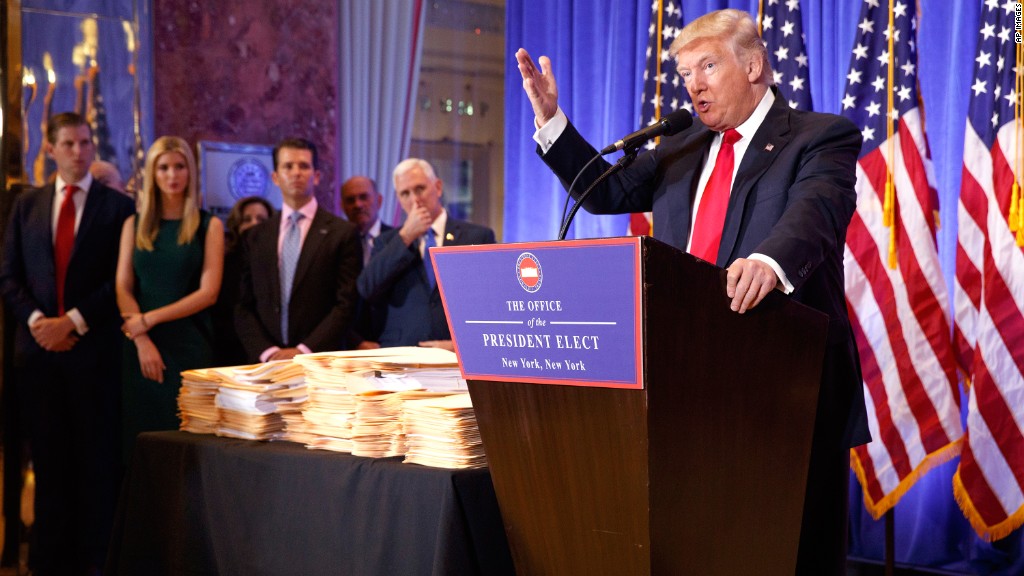
President-elect Donald Trump plans to get very tough with companies that do business in Mexico.
He reiterated his threat on Wednesday that companies manufacturing in Mexico and selling in the U.S. would face a "border tax."
"There will be a major border tax on these companies that are leaving and getting away with murder," Trump said at his first post-election news conference.
In December, Trump tweeted that they stand to face a 35% tax. In recent weeks, he even threatened GM (GM) and Toyota (TM), both of whom have large operations in Mexico.
The border tax that Trump was referring to could be one of two things: a tariff, or what Congressional Republicans want -- a border adjustment tax (BAT). A tariff only affects imports. A BAT affects imports and exports.
Related: What is a border adjustment tax
However, experts say that it is highly unlikely that Trump can impose either tariffs or a BAT against specific companies.
"There's nothing in the way that Congress wrote the various trade authorities that was intended to give the president power to go after a single company solely for producing abroad," says Edward Alden, a trade expert at the Council on Foreign Relations.
The office of the U.S. Trade Representative, which is in charge of negotiating trade deals, told CNNMoney in December that it did not know of a case of a tariff being applied specifically to a U.S. company. However, tariffs have been applied to foreign companies associated with U.S. firms to varying degrees.
Overall, Trump's intention is to save U.S. jobs. But when America has used tariffs before, the result has been mixed -- they save some U.S. jobs but cost others. Tariffs almost always raise prices on products for ordinary Americans.
Experts across the spectrum say if tariffs are applied on Mexico, it could retaliate against America by taxing U.S. goods shipped south of the border. That would be the beginning of a trade war.
The border adjustment tax can't be applied to specific companies either.
"It is not company-specific in any way, it would be imposed across the board," says Robert Scott, a trade expert at the Economic Policy Institute.
In theory, here's how a border adjustment tax works: It gives tax breaks to U.S. businesses that ship goods to other countries, and it takes away tax breaks from companies that bring in products from abroad.
Related: Remove car imports, and U.S.-Mexico deficit 'vanishes'
The idea is to discourage companies from putting jobs and operations overseas solely for tax reasons. Such a move usually results in making imports more expensive and exports cheaper.
But there's a catch. Supporters of a BAT say it will work if the dollar significantly rises in value in order to make sure Americans don't have to pay more for goods brought into the United States.
Proponents say the BAT will increase the dollar's value because, among other factors, U.S. exports would be cheaper and more attractive to foreign buyers. Higher demand for U.S. goods helps drive up the dollar's value.
However, skeptics say the cookie won't crumble that way.
Some experts estimate the dollar would have to rise as much as 20% for the BAT to be effective and not make Americans pay more for food, clothes and TVs.
Many don't believe the BAT will make the dollar jump that much because the greenback is influenced by lots of global factors, not just U.S. tax reform.
"My view is that while the dollar should appreciate further if the BAT is approved, it will not appreciate enough so as to keep the prices of imported goods from rising," says Carlos Peyrelongue, a Bank of America (BAC) research analyst based in Mexico.
It is important to note that Trump has wide ranging power to use tariffs against other countries without asking for approval from Congress. But under current laws, he can't impose a "major border tax" on specific companies.


